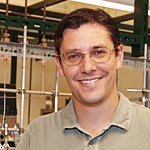![]() Renewable fuels and green petrochemical maker Anellotech Inc. has inked a deal with the University of Massachusetts-Amherst that will triple the amount of plastics feedstock made from biomass. The agreement adds a new technology capability to Anellotech’s process that triples the amount of p-xylene used to make plastic bottles, clothing, carpeting, automotive and other products usually made from nonrenewable petroleum but now could be produced from non-food biomass.
Renewable fuels and green petrochemical maker Anellotech Inc. has inked a deal with the University of Massachusetts-Amherst that will triple the amount of plastics feedstock made from biomass. The agreement adds a new technology capability to Anellotech’s process that triples the amount of p-xylene used to make plastic bottles, clothing, carpeting, automotive and other products usually made from nonrenewable petroleum but now could be produced from non-food biomass.
 Anellotech’s core technology, catalytic fast pyrolysis (CFP), was invented in Professor George W. Huber’s laboratory at the University of Massachusetts Amherst. Anellotech is developing the process to produce benzene, toluene, xylenes and olefins from non-food biomass. The additional breakthrough technology was first reported in an article published in the prestigious journal Angewandte Chemie in October 2012, where Professor Huber, Professor Fan and collaborators describe how to modify the catalyst used in this process to triple the yield of p-xylene within the benzene, toluene and xylenes product stream. The new invention allows the more economical production of renewable p-xylene from non-food biomass, thus enabling the production of lower-cost renewable PET. This research was funded by the Department of Energy Energy Frontiers Research Centers as part of the Catalysis Center for Energy Innovation which is led by the University of Delaware. Anellotech is currently working on scaling up the new CFP technology and bringing it to the market place.
Anellotech’s core technology, catalytic fast pyrolysis (CFP), was invented in Professor George W. Huber’s laboratory at the University of Massachusetts Amherst. Anellotech is developing the process to produce benzene, toluene, xylenes and olefins from non-food biomass. The additional breakthrough technology was first reported in an article published in the prestigious journal Angewandte Chemie in October 2012, where Professor Huber, Professor Fan and collaborators describe how to modify the catalyst used in this process to triple the yield of p-xylene within the benzene, toluene and xylenes product stream. The new invention allows the more economical production of renewable p-xylene from non-food biomass, thus enabling the production of lower-cost renewable PET. This research was funded by the Department of Energy Energy Frontiers Research Centers as part of the Catalysis Center for Energy Innovation which is led by the University of Delaware. Anellotech is currently working on scaling up the new CFP technology and bringing it to the market place.
“There is increasing demand for p-xylene, particularly for making consumer products” said David Sudolsky, President and Chief Executive Officer of Anellotech Inc. “This new technology we will be developing under license from the University of Massachusetts will enable beverage manufacturers to obtain 100% renewable PET bottles made from green ethylene glycol (already on the market by others) together with Anellotech’s green p-xylene.”
The process could replace some of the petroleum now used to make 54 million tons of PET (polyethylene terephthalate) globally.

